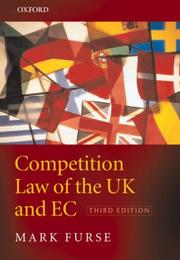Book
ISBN: 9041191097 9041191089 Year: 2017 Publisher: Alphen aan den Rijn, The Netherlands : Wolters Kluwer,
Abstract | Keywords | Export | Availability | Bookmark
 Loading...
Loading...Choose an application
- Reference Manager
- EndNote
- RefWorks (Direct export to RefWorks)
Book
ISBN: 9783406653100 Year: 2013 Publisher: München Beck
Abstract | Keywords | Export | Availability | Bookmark
 Loading...
Loading...Choose an application
- Reference Manager
- EndNote
- RefWorks (Direct export to RefWorks)
Book
ISBN: 9783161494147 Year: 2007 Publisher: Tübingen Mohr Siebeck
Abstract | Keywords | Export | Availability | Bookmark
 Loading...
Loading...Choose an application
- Reference Manager
- EndNote
- RefWorks (Direct export to RefWorks)
Book
Year: 2017 Publisher: [Place of publication not identified] : Great Neck Publishing,
Abstract | Keywords | Export | Availability | Bookmark
 Loading...
Loading...Choose an application
- Reference Manager
- EndNote
- RefWorks (Direct export to RefWorks)
Book
Abstract | Keywords | Export | Availability | Bookmark
 Loading...
Loading...Choose an application
- Reference Manager
- EndNote
- RefWorks (Direct export to RefWorks)
Antitrust law --- Antitrust law --- Antitrust law
Book
Year: 1967 Publisher: The Hague, : Martinus Nijhoff,
Abstract | Keywords | Export | Availability | Bookmark
 Loading...
Loading...Choose an application
- Reference Manager
- EndNote
- RefWorks (Direct export to RefWorks)
Antitrust law --- Antitrust law --- Antitrust law
Book
ISBN: 3631352158 Year: 1999 Publisher: Frankfurt am Main Lang
Abstract | Keywords | Export | Availability | Bookmark
 Loading...
Loading...Choose an application
- Reference Manager
- EndNote
- RefWorks (Direct export to RefWorks)

ISBN: 0199254877 Year: 2002 Publisher: Oxford Oxford University Press
Abstract | Keywords | Export | Availability | Bookmark
 Loading...
Loading...Choose an application
- Reference Manager
- EndNote
- RefWorks (Direct export to RefWorks)
Book
ISBN: 9780857936745 9780857936752 Year: 2013 Publisher: Cheltenham Edward Elgar
Abstract | Keywords | Export | Availability | Bookmark
 Loading...
Loading...Choose an application
- Reference Manager
- EndNote
- RefWorks (Direct export to RefWorks)
Book
ISBN: 9780191813368 9780198749158 Year: 2016 Publisher: Oxford : Oxford University Press,
Abstract | Keywords | Export | Availability | Bookmark
 Loading...
Loading...Choose an application
- Reference Manager
- EndNote
- RefWorks (Direct export to RefWorks)
This book provides an account of European competition law from the perspective of its coherence, in the context of modernization. Coherence is defined as consistency towards a clearly defined objective, in this case identified as the internal market. In addition, the performance on the variables efficiency and legitimacy is charted. While the focus is on antitrust, the book also examines merger and state aid control, as well as the sectoral regulatory frameworks for energy and electronic communications. For each of these the book looks at objectives, rules, and exceptions, as well as the way in which enforcement is organized. The findings are that the objectives of EU competition law are fairly straightforward as are the rules, but that the available exceptions vary widely between the different instruments and are disputed. Within antitrust and sectoral competition law enforcement is coordinated effectively between the EU Commission and networks of national (competition) authorities and can be deemed a success. For merger and state aid control a centralized model persists instead that resembles that of antitrust prior to modernization. Among future charges in the interest of coherence, legitimacy, and effectiveness of harmonization of remedies and procedure (now largely in the realm of national law) is likely.

 Search
Search Feedback
Feedback About UniCat
About UniCat  Help
Help News
News